The idea of access is something we think a lot about at Twitter and have since the company began. The founders thought about access in terms of a group of friends being able to instantly know what the others were up to. Whether that was moving into a new apartment in San Francisco or drinking a glass of wine in Napa Valley. For them, access was defined by immediacy and personal contact with people they knew offline.
As Twitter developed and became a product of the world, access took on a more ambitious, more significant meaning. It started to represent the democratic ideal of access for all. It applied to people who didn’t necessarily know each other, who might not be in the same country, same political spectrum, or same socioeconomic condition.
Thanks to the increasing pervasiveness of the internet and the growth of platforms like Twitter, access has become available at a larger scale than ever before. The United Nations’ Declaration of Human Rights states that “everyone has the freedom to hold opinions without interference and to seek, receive and share information regardless of frontiers”.
This may seem like an obvious statement, but throughout history there have been countless civilizations where the opposite was true. In fact, the withholding of information, the lack of access, was exactly how those in power maintained their control.
Dictators decided what people should and shouldn’t know. They used propaganda to influence the population - withholding facts or selectively sharing an altered version of events. In this way, they ensured their power was not questioned, and they could keep their country isolated from the rest of the world, limiting the introduction of other opinions and beliefs.
Today, people can access information from its original source, instantly. This makes it much more difficult to use information as a tool for wielding power because information is equally, immediately available. It means there are more perspectives on a news story - from mainstream media, eyewitnesses or the newsmakers themselves. It means the record can be set straight when something is reported inaccurately. And that what constitutes a news story is not just decided by a select few, but by individuals all over the world.
It means that a country can hold its government to account and that it’s harder to cover up the true version of events. It won’t end the use of propaganda, of course, but giving people direct access to information, and the ability to share and discuss it openly, provides a very strong counter balance. Today, information flows freely between geographic borders, between socioeconomic groups, and among people of different belief systems.
Because of the free flow of information, the people that we have access to has changed as well. If you rewind even a few years, only an elite group had direct access to world leaders or subject matter experts. The knowledge they had was shared almost exclusively with those in their immediate circles or students in their classrooms.
Today, I can hear directly from people like the Prime Minister of India, most of the astronauts currently in space, or literary legends like Salman Rushdie and Margaret Atwood. These are people who have become the best in their fields and we now have direct access to them.
People now also have increasing access to institutions. For governments and businesses this can be a scary proposition, but we see time and time again that those who embrace the idea of open access ultimately win over those who try to lock down the flow of information. A town in Southern Spain called Jun has taken this idea of open access to its furthest reaches.
Following the leadership of a forward-thinking mayor, the town has integrated Twitter into every part of how the government is run. The police have Twitter handles on their uniforms and cars. The mayor answers dozens of questions each day on Twitter. Citizens link their offline identity to their Twitter account and can connect directly to City Hall and report crimes or even broken street lamps with a Tweet. Jun Mayor José Antonio Rodríguez speaks passionately about this concept of public governance and how it has removed bureaucracy and increased the accountability and effectiveness of his government.
For most of history we have lived in a world with artificial barriers. Barriers to communication and the flow of information. Barriers based on status - political, racial, socioeconomic status. These artificial walls built between people limited our ability to truly see each other. They made it hard to have compassion for people living lives very different to our own. But these barriers are coming down. Access - to information, to people, to institutions - is becoming a reality for more and more people around the world.
So it is critically important that we work to make this access reach even further - to more people in more parts of the world. Our commitment is that we as a company will continue to navigate an increasingly complicated political landscape. We will deal with issues at the intersection of ethics, content and technology that have not been confronted before. We will make difficult decisions every day to ensure that as many people as possible have access, and that the smallest voices in the world can be heard.
And what we ask of you is that you use this access responsibly and with empathy. Use it to to shine a light on what’s good in the world and what needs to be changed, to champion the underserved, to embrace people’s differences, and amplify the best of humanity.
- Dick Costolo has been CEO of Twitter since October 2010. He stands down on 1 July.
